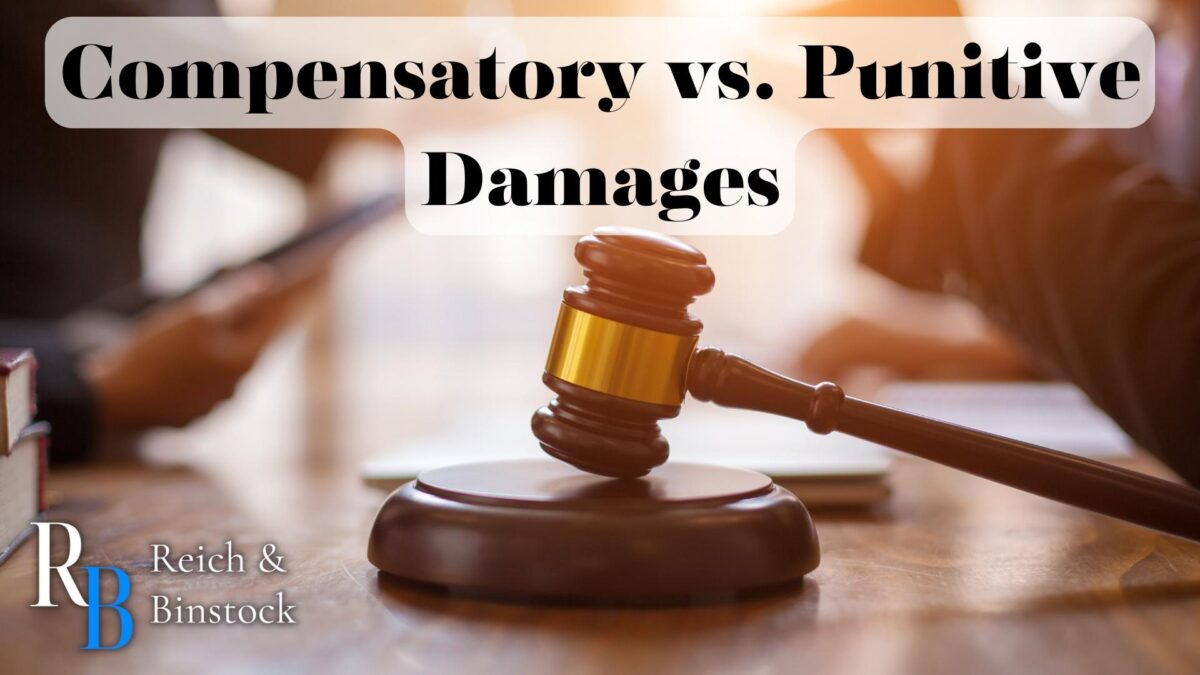An important element in every personal injury case is the damages awarded to victims. Damages are often used to repay the plaintiff for the financial losses, injuries, property damage, and other losses they may have suffered as a result of an accident. The plaintiff can also receive damages aimed to further punish the negligent party for their actions. In this blog, we explain the differences between compensatory vs punitive damages in personal injury cases.
Understanding the two types of damages that can be awarded in a personal injury case can help plaintiffs understand what financial reimbursement they’re entitled to and why. The Houston personal injury attorneys from Reich & Binstock will explain the two types of damages that a person can win in a lawsuit.
If you were injured in an accident caused by a person’s negligence, you could be entitled to financial compensation. To learn more about your legal options, call Reich & Binstock at (713) 622-7271.
What Are the Types of Damages in Personal Injury Cases?

Once your personal injury attorney has proven negligence occurred, they’ll relate the negligence actions to the injuries you’ve sustained, otherwise known as causation. Once negligence and causation have been established, the next step in your personal injury lawsuit is to decide what damages you want to recover.
Damages are the money a person can receive as compensation for their injuries and/or losses. Personal injury cases can result in the plaintiff winning two types of damages that are eligible for payment.
What Are Compensatory Damages?
The first type of damages that can be recovered in personal injury claims is compensatory damages. Items that fall under this category of damages are awarded to reimburse victims for actual damages they’ve suffered because of the person’s negligent actions.
Compensatory damages awarded can fall under two subcategories: general and special damages.
General Damages
General damages are also known as non-economic damages. The damages are much harder to quantify than special damages because they are not given a monetary value. General damages are awarded for subjective losses suffered by the victim that can include:
- Physical pain and suffering
- Emotional distress
- Mental anguish
- Disability
- Loss of enjoyment of life
- Scarring and disfigurement
- Loss of consortium
Since general damages are intangible, they can be difficult to recover adequate compensation for. It’s crucial to work with an experienced personal injury attorney when looking to recover non-economic damages.
Your Houston personal injury attorney from Reich & Binstock will work diligently to prove you should receive non-economic damages by presenting evidence and consulting with expert witnesses, like psychiatrists or other mental health experts.
Special Damages
The other compensatory damages that a person can receive are special damages, also known as economic damages. These damages are much easier to calculate because receipts and bills provide documentation showing their value. The most common type of special damages awarded in personal injury cases are:
- Lost wages
- Medical bills, both past, present, and future
- Medical expenses like prosthetics, mobility aids, and other devices
- Physical therapy and rehabilitation costs
- Home health care costs
- Property damage repairs and replacements
- Home modifications to accommodate a disability
- Counseling
When pursuing a personal injury claim, it’s important to keep any medical bills or receipts that your attorney can use when calculating the amount of special damages.
What Are Punitive Damages?
Punitive damages are the other type of recoverable damages that a person can recover from a personal injury case. Punitive damages differ from compensatory damages because they are not awarded to reimburse or compensate a person for their losses.
Instead, a negligent party may be ordered to pay punitive damages if they’re found guilty of gross negligence or illegal behaviors. For example, judges may award punitive damages in medical malpractice cases as a way to further punish the doctor responsible. By awarding punitive damages, the hope is that the guilty party will be deterred from repeating their harmful and grossly negligent actions. The amount a guilty party will be required to pay for punitive damages is usually left to the court’s discretion.
What Is the Difference Between Compensatory and Punitive Damages?

There are several differences between compensatory and punitive damages, including how they’re calculated and how often they are awarded. However, the biggest difference between the two types of damages is their purpose.
Compensatory damages are given to recoup losses a person has suffered as an effort to make up for the accident and/or injuries. Punitive damages are awarded to punish the guilty party. In lawsuits where the at-fault party exhibited extreme disregard for the safety, health, and rights of others, they are often ordered to pay punitive damages.
Examples of When Compensatory Could Be Awarded
Compensatory damages are offered to help victims of negligent actions. The most common accidents where a person can receive compensatory damages are:
- Car accidents
- Motorcycle accidents
- Truck accidents
- Boating accidents
- Pedestrian accidents
- Bicycle accidents
- Workplace accidents
- Construction site accidents
- Slip and fall accidents
Examples of When Punitive Damages Could Be Awarded

Punitive damages are only awarded in cases when the guilty party shows gross negligence and disregards the safety and well-being of others. Examples of cases that can result in punitive damages are:
- Accidents that result in a person being severely injured
- Class action lawsuits where multiple people were injured
- Lawsuits where the responsible party causes intentional harm to the plaintiff
- Medical malpractice cases where negligent actions lead to serious injuries or death
- Cases that appear to be motivated by evil intentions where the at-fault party engaged in activities deemed as socially unacceptable
How Often Are Punitive Damages Awarded?
According to Cornell Law School, an estimated 5% of verdicts result in punitive damages. Punitive damages are typically no greater than four times a victim’s compensatory damages. However, many states limit the amount of punitive damages a person can be awarded.
Can a Plaintiff Receive Both Compensatory and Punitive Damages?

Yes, a person can receive both compensatory and punitive damages. The chances of a plaintiff receiving compensatory damages, though, are much greater than punitive damages. As stated above, punitive damages are awarded in extreme cases in addition to compensatory damages.
In State Farm v. Campbell, the Supreme Court ruled that punitive damages should be given only if the defendant’s actions are considered so disgraceful that they deserve further punishment after paying compensatory damages.
Contact a Houston Personal Injury Lawyer with Reich & Binstock Today
It’s important to understand the damages that you’re entitled to following an accident caused by a person’s negligence. When pursuing a personal injury claim, you can trust that the Houston personal injury attorneys from Reich & Binstock will fight for your rights to recover the maximum amount of damages you deserve. Your personal injury attorney will also evaluate your case to determine whether you qualify to receive punitive damages.
To schedule a free consultation with an experienced personal injury attorney at Reich & Binstock, call (713) 622-7271 today.














